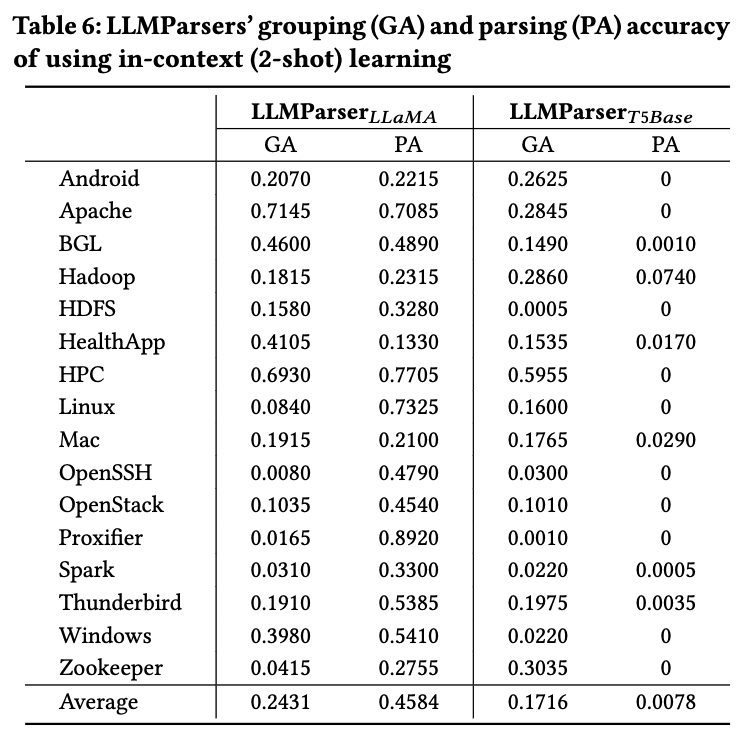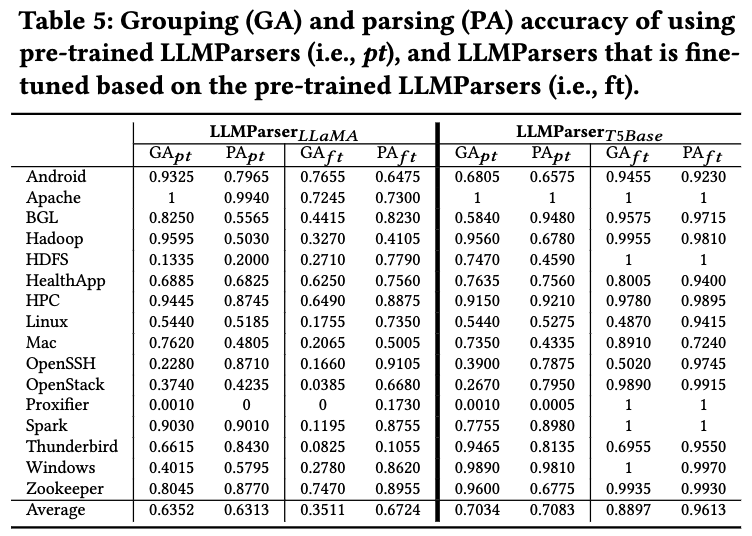This repo is the package for [ICSE2024] "LLMParser: An Exploratory Study on Using Large Language Models for Log Parsing"
Logs are important in modern software development with runtime information. Log parsing is the first step in many log-based analyses, that involve extracting structured information from unstructured log data. Traditional log parsers face challenges in accurately parsing logs due to the diversity of log formats, which directly impacts the performance of downstream log-analysis tasks. In this paper, we explore the potential of using Large Language Models (LLMs) for log parsing and propose LLMParser, an LLM-based log parser based on generative LLMs and few-shot tuning. We leverage four LLMs, Flan-T5-small, Flan-T5-base, LLaMA-7B, and ChatGLM-6B in LLMParsers. Our evaluation of 16 open-source systems shows that LLMParser achieves statistically significantly higher parsing accuracy than state-of-the-art parsers (a 96% average parsing accuracy). We further conduct a comprehensive empirical analysis on the effect of training size, model size, and pre-training LLM on log parsing accuracy. We find that smaller LLMs may be more effective than more complex LLMs, where Flan-T5-base achieves comparable results as LLaMA-7B with a shorter inference time. We also find that using LLMs pre-trained using logs from other systems does not always improve parsing accuracy. Using pre-trained Flan-T5-base shows an improvement in accuracy, but a decrease in pre-trained LLaMA (decrease by almost 55% in group accuracy). In short, our study provides empirical evidence for using LLMs for log parsing and highlights the limitations and future research direction of LLM-based log parsers.
We present LLMparser repository structure below.
.
├── LLMs
│ ├── chatglm.sh
│ ├── flan-t5-base.sh
│ ├── flan-t5-small.sh
│ └── llama.sh
├── README.md
├── chatglm
│ ├── eval.py
│ ├── modeling_chatglm.py
│ ├── run_copy.sh
│ └── train.py
├── data_sampling.py
├── docs
├── env_init.sh
├── evaluate
│ └── evaluator.py
├── fine_tuned_model
├── flan-t5
│ └── train.py
├── llama
│ ├── 1.py
│ ├── Dockerfile
│ ├── cross_eval.py
│ ├── docker-compose.yml
│ ├── eval.py
│ ├── export.sh
│ ├── export_hf_checkpoint.py
│ ├── finetune.py
│ ├── pyproject.toml
│ ├── run.sh
│ └── utils
│ ├── README.md
│ ├── __init__.py
│ ├── __pycache__
│ │ ├── __init__.cpython-39.pyc
│ │ └── prompter.cpython-39.pyc
│ ├── callbacks.py
│ └── prompter.py
├── logs
│ └── ...
├── output
└── requirements.txt
sh env_init.shTo download the Large Language Models:
cd LLMs
sh flan-t5-base.shSample 50 logs from Mac dataset
python data_sampling --project "Mac" \
--shot 50Flan-T5-base or Flan-T5-small (fine-tuned with 50 shot)
cd flan-t5
python train.py --model "flan-t5-base"\
--num_epochs 30 \
--learning_rate 5e-4 \
--train_percentage "cross" \
--validation "validation" \
--systems "Mac,Android,Thunderbird,HealthApp,OpenStack,OpenSSH,Proxifier,HPC,Zookeeper,Hadoop,Linux,HDFS,BGL,Windows,Apache,Spark"LLaMA (fine-tuned with 50 shot)
cd llama
sh run.sh 0.025ChatGLM (fine-tuned with 50 shot)
cd chatglm
sh run.sh 0.025Evaluate LLM parsing result on certain training dataset size (Flan-T5-base result on 50 shots)
cd evaluate
python evaluator.py --model "flan-t5-base" \
--train_percentage "0.025" \
--systems "Mac,Android,Thunderbird,HealthApp,OpenStack,OpenSSH,Proxifier,HPC,Zookeeper,Hadoop,Linux,HDFS,BGL,Windows,Apache,Spark" 



